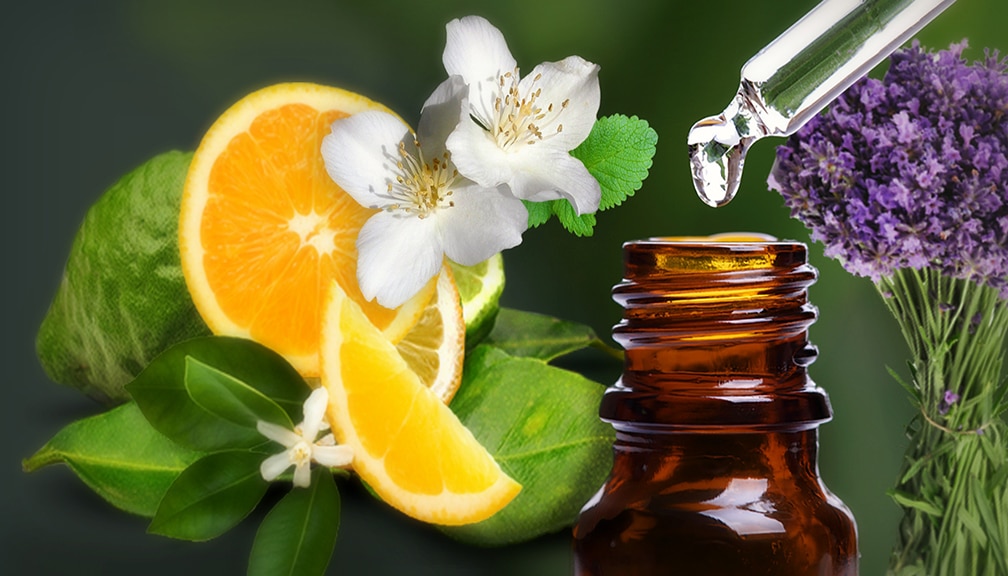AROMATHERAPY — It’s my new favorite thing. But although it may be a new thing for me, it has been an established practice for many cultures for thousands of years. Plant essences have been highly valued and used to promote health and well-being as far back as 3,500 BC. Naturally extracted from petals, stems, twigs, leaves, roots, grasses or fruits, highly concentrated aromatic oils can elicit emotional responses, and are used to create positive mood states, to soothe nerves and to conjure a sense of euphoria.
How does it work?
Essentials oils directly affect our brains using two different methods: inhalation and absorption.
Inhalation: When aromas are inhaled they reach the olfactory bulb at the top of the nose, which is an extension of the portion of the brain called the limbic system. The limbic system is composed of structures that deal with emotions, memories and stimulation, and it is there that essential oil molecules can trigger an emotional shift.
Absorption: Essential oils can also be absorbed into the bloodstream through the skin. As the oil circulates through the body’s bloodstream it is delivered to the brain.
Creative Enhancement
It is believed that aromatherapy can be especially beneficial for the artistic soul. Essential oils can increase creativity by stimulating certain messages to the brain and enhancing relaxation and positivity. Leonardo Da Vinci is said to have used aromatics as a method of inducing inspiration, and his essential oil of choice was Neroli oil. Neroli is a citrus-based fragrance with the ability to elevate the mood and relieve anxiety.
Other oils credited with the ability to enhance creativity are:
• Bergamot – Fruity and sweet, it reduces stress, anxiety and apathy.
• Frankincense – This spicy oil calms and soothes the whole body and mind.
• Jasmine – Deliciously fragrant, it produces feelings of calm, confidence, optimism and euphoria.
• Cypress – eliminates mental fog and nervous tension
• Orange Citrus – stimulates joy, eases anxiety and worry
• Eucalyptus – boosts enthusiasm, creativity and mental acuity
• Lavender – enhances mood, induces relaxation
• Peppermint – invigorates the mind, promotes concentration
• Clary Sage – increases intuitive powers, inspires higher consciousness
• Rosemary – improves mental clarity
Using aromatic oils that make you feel positive, relaxed or euphoric, you can create a mental environment where your creativity can flourish. Try putting a few drops of your favorite essential oil in a diffuser or cotton ball and inhale the aroma as you work. You can also rub a bit into the palms of your hands by diluting a few drops of the essential oil with a teaspoon of “carrier” oil, such as sunflower or olive. And a massage with essential oils is sure to relax.
Experiment with different scents to choose ones that will inspire you the most. You can blend a few essential oils together to customize an aroma that is the most pleasing and effective for you. Great information and aromatic recipes can be found in “The Fragrant Mind: Aromatherapy for Personality, Mind, Mood, and Emotion” by Valarie Ann Worwood.
Enjoy, however remember, most essential oils have been shown to be safe when used as directed, but they are distilled to be powerful. So take caution when applying to the skin as side effects may include allergic reactions. Also further research is needed to determine how essential oils might affect children or women who are pregnant or breastfeeding.
Artist Ora Sorensen (orasorensen.com) was born in New York but grew up overseas. She has owned a gallery in Delray Beach, Florida, for 20 years, and has also been represented by other galleries across the country. Sorensen now lives and paints in North Carolina, and her paintings are collected worldwide and have been shown in numerous exhibitions.





Great article! Allergic reactions only happen when a protein is present. If it’s a pure essential oil, no proteins or toxins should be present. Be careful with your choice of essential oil. Quality matters, especially in high concentrations!
Comments are closed.